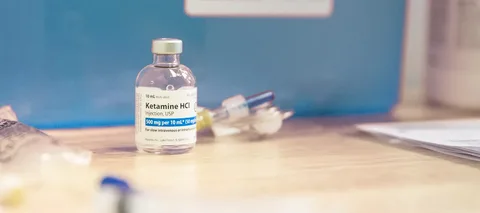Ketamine, a powerful anesthetic drug, has recently gained attention for its potential in treating various mental health conditions, such as depression, anxiety, and post-traumatic stress disorder (PTSD). While ketamine infusion therapy has shown promising results, the question of whether it is covered by insurance remains a complex one. In this comprehensive article, we’ll explore the current landscape of insurance coverage for ketamine infusions, the challenges patients face, and potential solutions to make this treatment more accessible.

Understanding Ketamine Infusion Therapy
Ketamine infusion therapy involves the intravenous administration of ketamine to manage severe mental health conditions. It works by targeting the brain’s N-methyl-D-aspartate (NMDA) receptors, which are believed to play a role in the development and maintenance of these disorders[5]. Ketamine has been shown to have a rapid and potent antidepressant effect, with some studies reporting response rates of close to 80% after a short course of infusions[2].
Insurance Coverage for Ketamine Infusions
Most major insurance companies in the United States do not currently cover ketamine infusions for the treatment of mental health conditions[2]. This is because ketamine is not approved by the Food and Drug Administration (FDA) for these off-label uses. Some insurance companies, such as Blue Cross Blue Shield of North Carolina, have explicitly stated that they will not cover ketamine infusions under any circumstances[2].
However, there are a few exceptions to this rule. Blue Cross Blue Shield of Massachusetts has released a formal policy and authorization process for obtaining coverage for ketamine infusions[2]. Additionally, some clinics may attempt to bill insurance companies using codes that are somewhat related to the infusion, such as the code for an injection or an EKG, but this practice is generally frowned upon and may be considered fraudulent[2].

Superbill Submission
Many ketamine clinics provide patients with a superbill, which is an itemized receipt that can be submitted to insurance companies for potential reimbursement. While some insurance companies do reimburse for these submissions, they typically only cover the “evaluation and management” portion of the appointment, rather than the infusion itself[2]. If the insurance company requests records and looks closely enough, they may not actually reimburse the patient for the appointment.
Health Savings Accounts (HSAs) and Flexible Spending Accounts (FSAs)
Patients may be able to use pre-tax dollars from their Health Savings Accounts (HSAs) or Flexible Spending Accounts (FSAs) to cover the costs of ketamine infusion therapy[1]. These accounts allow individuals to set aside money for medical expenses, including treatments that may not be covered by insurance.
Payment Plans
Many ketamine clinics offer payment plans to help patients manage the costs of treatment[1]. These plans can be tailored to individual budgets and may make ketamine infusion therapy more accessible for those who cannot afford the full cost upfront.
Appealing Insurance Denials
If an initial request for coverage is denied by an insurance company, patients may consider appealing the decision. To strengthen their case, patients should gather supporting documentation, such as medical records and letters from their healthcare providers[1]. It’s important to note that the appeals process can be time-consuming and may not always result in a favorable outcome.
The Future of Insurance Coverage
As ketamine infusion therapy continues to gain recognition for its potential in treating mental health conditions, there is hope that more insurance companies will begin to cover these treatments. The development of Spravato (esketamine), a nasal spray that is FDA-approved for treatment-resistant depression, may pave the way for increased coverage of ketamine-based therapies[2].
Additionally, initiatives like Enthea, a special benefit offered by certain employer-sponsored health plans, allow patients to access insurance coverage for ketamine-assisted therapy[2]. As more plans adopt similar programs, the availability of insurance coverage for ketamine treatments may expand.

Conclusion
While the current landscape of insurance coverage for ketamine infusion therapy is limited, there are steps patients can take to potentially reduce the financial burden of this treatment. By exploring options like HSAs, FSAs, payment plans, and appealing insurance denials, patients can work towards making ketamine infusion therapy more accessible.
As research continues to demonstrate the efficacy of ketamine in treating mental health conditions, it is likely that more insurance companies will begin to recognize the value of these treatments. In the meantime, patients should advocate for their right to access this potentially life-changing therapy, while also being aware of the financial implications and exploring all available options for coverage and reimbursement.
Remember, the journey to better mental health is not always easy, but with determination and a bit of humor, we can navigate the challenges together. As the saying goes, “Laughter is the best medicine, except for ketamine – that stuff is pretty good too!” (Just kidding, please consult your healthcare provider before trying any new treatments).
So, if you or a loved one is struggling with a mental health condition and are considering ketamine infusion therapy, don’t be afraid to explore your options and fight for the coverage you deserve. With a little persistence and a lot of cat memes, we can make the world a happier, more ketamine-infused place!
Citations:
[1] https://www.painmedicineconsultants.com/blog/how-to-get-ketamine-infusions-ketamine-therapy-covered-by-insurance
[2] https://bespoketreatment.com/blog/the-truth-on-whether-ketamine-is-covered-by-insurance-or-not/
[3] https://ketaminestartup.com/blog/starting-our-ketamine-clinic
[4] https://www.osmind.org/blog/how-to-write-iv-ketamine-administration-notes-template-guide
[5] https://www.ncbi.nlm.nih.gov/pmc/articles/PMC4014022/
[6] https://www.webmd.com/depression/features/what-does-ketamine-do-your-brain
[7] https://www.ncbi.nlm.nih.gov/pmc/articles/PMC8715255/
[8] https://healthcare.utah.edu/hmhi/treatments/ketamine-infusion



